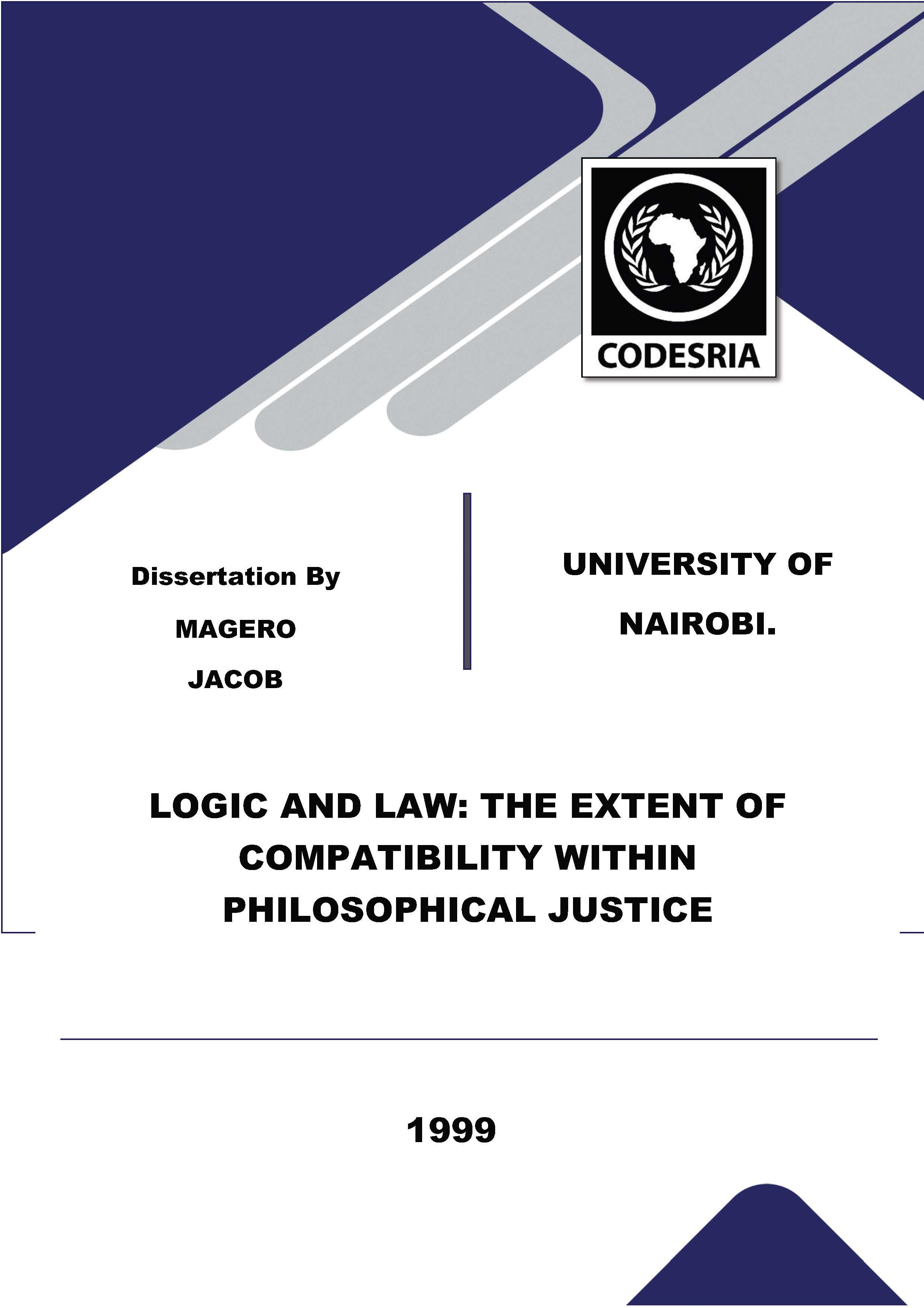LOGIC AND LAW: THE EXTENT OF COMPATIBILITY WITHIN PHILOSOPHICAL JUSTICE
Keywords:
PHILOSOPHICAL JUSTICESynopsis
An invariant emphasis on the possible prospects ( objectivity, efficiency and predictability) of the employment of the logical method in the evaluation of social phenomena implies a state whereby "Ïogical idealism rans away with some minds" i.e. the logical method when invariantly employed is inimical to the recognition, realisation, and appreciation of the human e\ement (the relative unpredictability and the uniqueness of every instantial social .event) in reality. This is especially (if not particul.arly) with regard to the realm oflaw and the notion ofjustice. It is important to note however that the focus of the study in this regard has been on law and the concomitant notion of justice. This has been from the point of view of a keen impartial observer with a critical, analytic, and reflective mind (philosophy or philosopher). Since the notion of justice pervades and permeates ail aspects ofhuman social. relations and social dynamics in general, subsisting and enduring, it is a notion
which encapsulates the dynamics involved in human social problems and the redress (even ifjust attempts to redress) ofthem.The endeavour of this study has constituted in the evaluation therefore of the applicability oflogic in the practice oflaw. This has been actualised by an explication and analysis oflogic (and rationality as a natural human endowment) as a discipline, law and justice as notions, and a reflection on the interrelation of the three (logic, law and justice) in respect of human social life. The activity has led to the conclusion that the applicability of logic in the practice of law can only be appropriately defined in the strict sense l?y a philosopher. This implies CODESRIA -
Downloads
References
Abbaker, A. E (1995) Jslamization in Sudan (Arabie). Unpublished P.G.D. Dissertation, IAAS, University of Khartoum.
Abdelgadir, E. (1994) Poverty Problems in Sudan (Arabie), Khartoum: Institute of Research and Social Studies.
Abdelmannan, M. (1981) lnstitutional settings of lslamic Economie Order, Discussion Paper Series No. 2, Internatiànal Centre for Research in Islamic Economies, Jeddah: King Abdelaziz Uniyersity Press.
Abdelmannan, M. (1982) Why is lslamic Economic_s Important? Seven Reasons for Believing, Research
Series No. 12, International Centre for lslamic Economies, Jeddah: King Abdelaziz pniversity Press.
Abdelrahman, M. (1981) Hassan El-Banna and Modern Islamic Revival Movement (Arabie), Unpublished P.G.D. ·Dissertation, IAAS, University of Khartoum.
Ahmed, M.A. (1986) Sudan: Unity in Diversity, Riyadh: King Saud University Press.
Ahmed, K. (ed.) (19$'8) Studies in /slamic Economies, Leicester: The Islamic Foundation. -
Ali, A.A. (1982) The Political Economy of Banking in the Sudan; 1970-1977, DSRC Seminar Series, Discussion Paper Nô: 11, (April) DSRC, University of Khartoum.
Mekki, H. (1990) The lslamic Movement in Sudan (1969;-1985): History and Political Discourse (Arabie), Khartoum: Institt1te of Research and Social Studies.
Mohamed, A. (ed.) (1982) Monetary and Fiscal Economies of Islam, Jeddah: International Centre for Re earch in Islamk Economies, King Abdelaziz University.
Naqvi, S. N. (1981) Ethics and Economies: An lslamic Synthesis, London: The Islamic Foundation.
News Week, (1993) Islamic Banking: A Global Success Story, April 26. Niblock, T. (1986a) "The Background to Change in Gov- rnmentin 1984", inP. R. Woodward (ed.) Sudan Since,;Sif mè!"ixr.c{, SOAS, University of London. -
Niblock, T. (1986b) "Numayri's Fall: The Econ9mic Base' in M. Abd-Al-Rahim et al (eds.) Sudan Since lnde[lendence, Aldershot: Gower.
Niblock, T. (1987) Class and Power in Sudan: The Dynamics of Sudanese Politics 1898-1985, London: Macmillan.
O'Neil, N. (1983) "Recent Trends in Foreign Investment and Even Development in Sudan", Review of African Politiçal Economy, Special Issue, No. 26 (July), PP 60-64.. ·
O'Neil, N. and O'Brien, J. (1985) "Sowing the Seeds of f:'amine: The Political Economy of Food Deficit in Sudan", Review ·of African Political Economy, No. 33, PP 23-32. ,.
O' Neil, N. and O'Brien, J. (eds.) (1989) Economy and Class in Sudan,Aldershot: Averbury. ··
Pelletreau, R. (1994) "US Policy and the Islamic Reviyal", US Information Service, The American Centre, Khartoum.
Rafikhan, S. (1987) "Profit and Loss Sharing as a Suqstitute for Interest in Islamic Banking", Saving and Development, Vol:11, No. 3.






